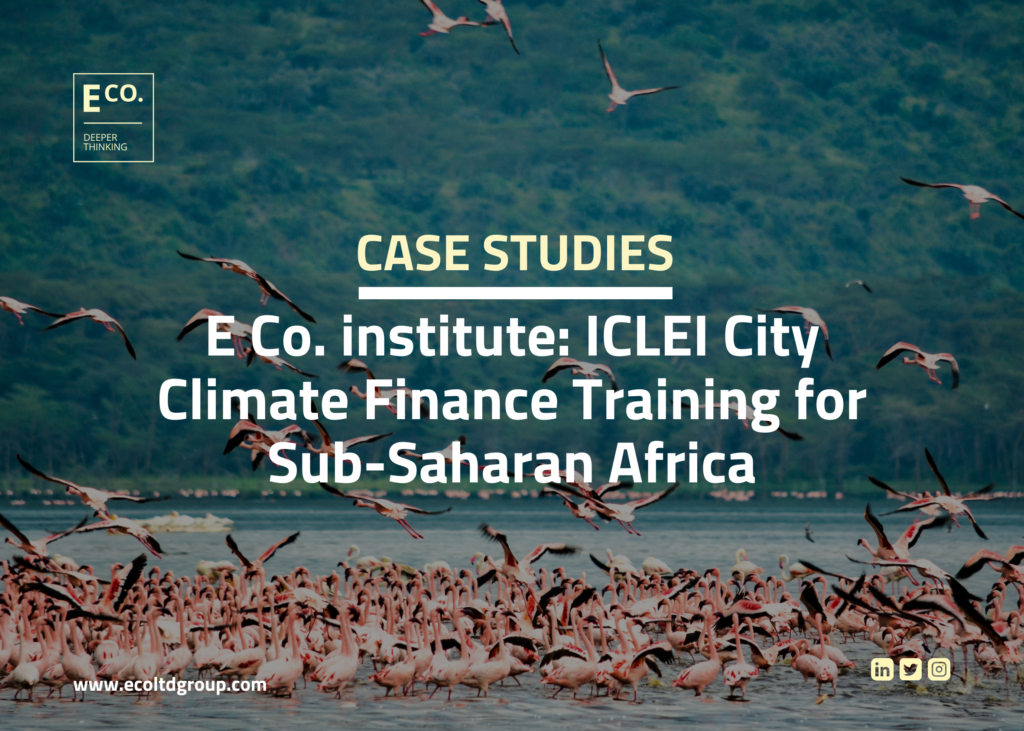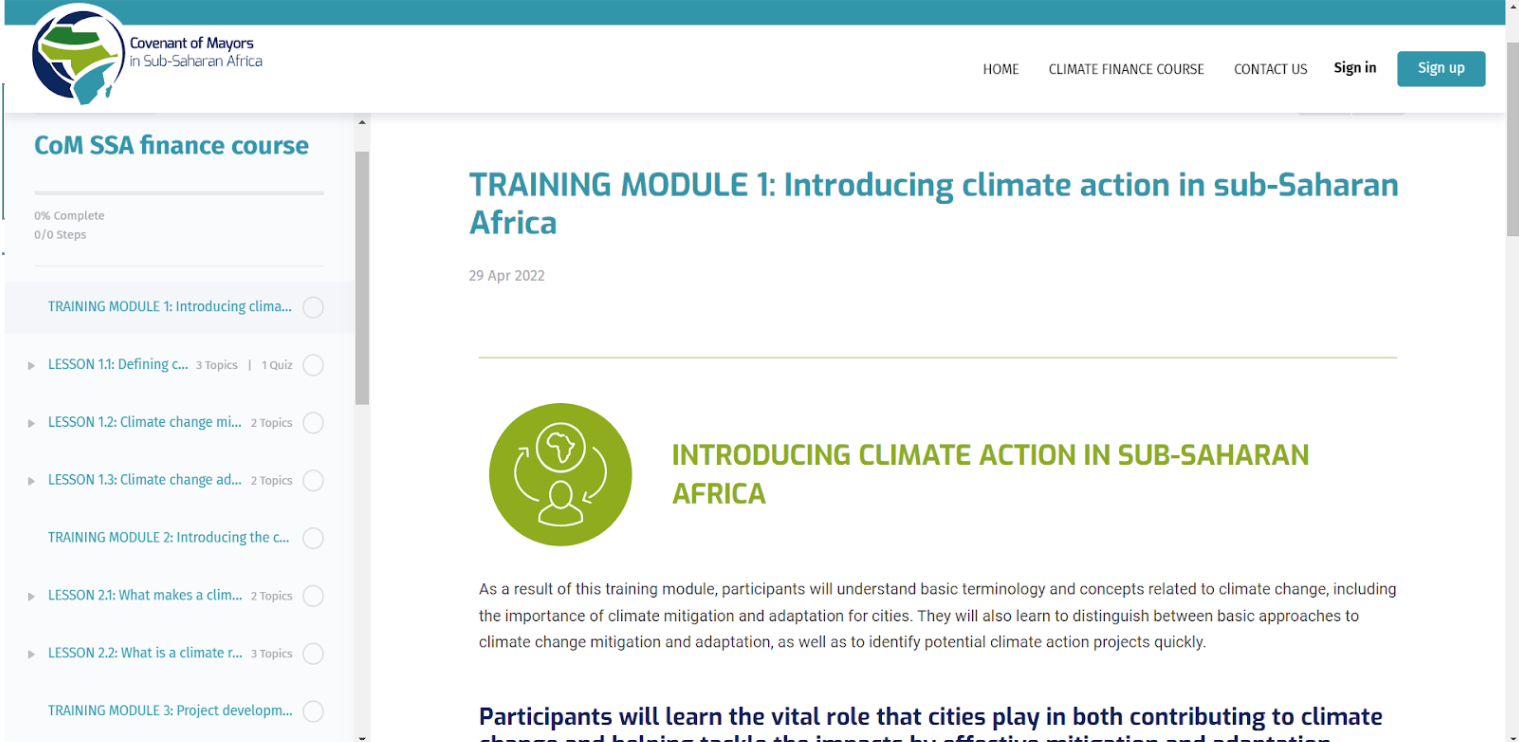E Co. institute: ICLEI City Climate Finance Training for Sub-Saharan Africa

Climate change is inherently unjust and causes an unequal distribution of negative impacts, and so climate finance training has become a must in many scenarios. The countries, and cities, that only contribute minimally to global greenhouse gas emissions are often those that are most vulnerable and suffer the greatest impacts. Africa contributes only 3.8% to global emissions despite having a population of more than 1.3 billion. Sub-Saharan Africa specifically only contributes around 0.55% of global emissions. Yet, the impacts of climate change in the region are causing higher temperatures, prolonged droughts and increased intensity of extreme weather events such as floods, each of which has detrimental impacts in the affected areas.
Determining climate finance needs in the region is vital to identify financing gaps and opportunities. Combatting climate change by implementing the targets provided in the Nationally Determined Contributions (NDCs) is expected to cost Africa USD 2.8 trillion by 2030. To put this figure in perspective, the total current GDP of all sub-Saharan African countries is USD 1.92 trillion. So far, African governments have committed USD 264 billion to tackling climate change, slightly less than 10% of the required cost, meaning the remaining 90% must come from other sources. Moreover, despite the low contribution to emissions, mitigation accounts for 66% of total climate finance needs compared to just 24% for adaptation.
The assignment
From private sector investment to international financial institutions, finance for climate action is available. However, understanding the sources and mechanisms as well as how to successfully navigate the climate finance landscape is challenging. ICLEI – Local Governments for Sustainability is a global network of more than 2,500 local and regional governments committed to sustainable urban development. ICLEI influences sustainability policy and drives local action for low emission, nature-based, equitable, resilient and circular development. ICLEI Africa implements an initiative called the Covenant of Mayors in Sub-Saharan Africa (CoM SSA). The purpose of CoM SSA is to support local governments in moving from planning to implementation, with a focus on unlocking climate finance at the local level.
As part of the work being done with CoM SSA signatories, ICLEI Africa, with generous funding from GIZ, wanted to develop a virtual climate finance training course aimed at CoM SSA signatory cities and subnational governments’ officials to strengthen their understanding of how to access to climate funding to foster climate and energy access projects and initiatives at local and subnational levels. This course would allow participants to learn about the risks of climate change in the region and the climate finance landscape in Sub-Saharan Africa at their own pace and be able to apply their learning to their own city context.
E Co’s role in the assignment
Given our significant experience in designing and delivering training on accessing climate finance, E Co. developed the content for all six modules of the course. The assignment began by conducting a gap analysis to review all relevant and recent climate finance training material and successfully identify what resources already exist and what valuable information is missing. This included the review of materials relating to Sub-Saharan Africa, sub-national (city) involvement in climate action and the broader climate finance landscape. The results of the gap analysis served as a basis for further development of the training contents and material. Building upon this, the team then conducted interviews with 11 stakeholders in the Sub-Saharan African region to understand the information that was most helpful and needed to be included in the course content while also plugging the gaps identified in the gap analysis. These interviews were valuable in guiding the topics to be covered in the course and the core content for each topic. E Co. then designed six modules covering a broad range of topics that participants could
learn from to take the right steps to access climate finance. These are:
1. The basic science of climate change and the impacts in the context of Sub-Saharan Africa
2. An introduction to climate projects and the importance of an effective and accurate climate rationale when designing a climate project
3. Understanding the phases of the project development cycle from the start to the implementation
4. What funders look for when designing climate projects and understanding the different financial instruments available and identifying financial institutions and
donors
5. Exploring the different climate finance mechanisms and sources available to local governments in Sub-Saharan Africa (such as international funds, like the GEF and GCF, development banks, private sector, etc.)
6. The importance of partnerships and networks to help local governments secure finance for climate action, including specific networks in the region
For each module, detailed case studies were designed to help make the content more understandable and quiz questions were provided to reinforce participants’ learning. As a final step, E Co. prepared a facilitator’s guideline aimed at assisting the delivery of the training modules to participants. Although the course is intended to be completed online and self-paced, ICLEI frequently convenes in-person workshops and meetings. Therefore, this guide helps a facilitator successfully deliver the content in a more inter-personal environment.
What our clients said
“Many many thanks for the HUGE amount of work that has gone into the climate finance work with ICLEI Africa. I know this has been a significant mountain of work in a near impossible timeline. So, on behalf of my whole team, I wanted to thank you and your team for the amazing, high-quality work.” Kirsty Griffin, ICLEI
You can find the link to the course by clicking this link. You can also study this course in French here.
Do you need climate finance training for you or your team? Learn more about our E Co. institute offerings here.
Work with our consultants on your climate-resilient projects today
Let’s accelerate progress together: Get in touch with our climate finance consultants to discuss a project you’re working on. Email us at: amy@ecoltdgroup.com or find us at the following:
Twitter: @ecoltdnews
LinkedIn: E Co.
Instagram: @ecoltdnews
Please feel free to share your comments below or send an email to: gcfinsight@ecoltdgroup.com
